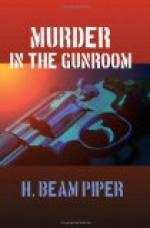“Then you knew, since yesterday, that he would do this?” Varcek asked.
“I knew one or the other of you would,” Rand replied. “I had quite a few reasons for thinking it might be Dunmore, and one good one for not suspecting you.”
“You mean my dislike for firearms?”
“That could have been feigned, or it could have been overcome,” Rand replied. “I mean your knowledge of biology and biochemistry. If you’d killed Lane Fleming, there’d have been no clumsy business of fake accidents; not as long as both of you ate at the same table. He’d have just died, an unimpeachably natural death.” He turned to Ritter. “Dave, I’m going upstairs; I want to get out of this damned coat of mail I’m wearing. While I’m doing it, I want you to call Carter Tipton, at the Jarrett place, and Humphrey Goode, and Mick McKenna, in that order. Tell Goode to get over here as fast as he can, and come up to my room; tell him we have to consider ways and means of implementing my suggestion to him.”
CHAPTER 21
In the month which followed, events transpired through a thickening miasma of rumors, official communiques, journalistic conjectures, and outright fabrications, fitfully lit by the glare of newsmen’s photo-bulbs, bulking with strange shapes, and emitting stranger noises. There were the portentous rumblings of prepared statements, and the hollow thumps of denials. There were soft murmurs of, “Now, this is strictly off the record ...” followed by sibilant whispers. The unseen screws of political pressure creaked, and whitewash brushes slurped suavely. And there was an insistent yammering of bewildered and unanswered questions. Fred Dunmore really had killed Arnold Rivers, hadn’t he? Or had he? Arnold Rivers had been double-crossing Dunmore ... or had Dunmore been double-crossing Rivers? Somebody had stolen ten—or was it twenty-five—thousand dollars’ worth of old pistols? Or was it just twenty-five thousand dollars? Or what, if anything, had been stolen? Was somebody being framed for something ... or was somebody covering up for somebody ... or what? And wasn’t there something funny about the way Lane Fleming got killed, last December?
The surviving members of the Fleming family issued a few noncommittal statements through their attorney, Humphrey Goode, and then the Iron Curtain slammed down. Mick McKenna gave an outraged squawk or so, then subsided. There was a series of pronunciamentos from the office of District Attorney Charles P. Farnsworth, all full of high-order abstractions and empty of meaning. The reporters, converging on the Fleming house, found it occupied by the State Police, who kept them at bay. Harry Bentz, of the New Belfast Evening Mercury, using a 30-power spotting-’scope from the road, observed Dave Ritter, whom he recognized, wearing a suit of butler’s livery and standing in the doorway of the garage, talking to Sergeant McKenna, Carter Tipton and Farnsworth; the Mercury exploited this scoop for all it was worth.




